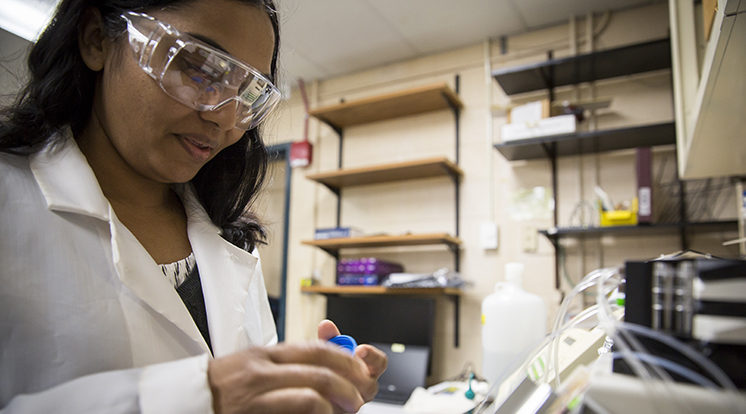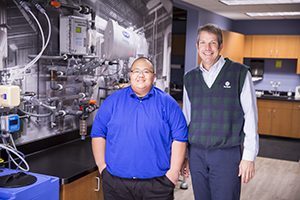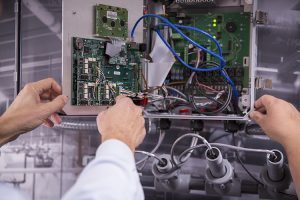
Anuja Patel, a student at Gateway Technical College, works in the lab at UWM’s School of Freshwater Sciences. Research in the lab is part of the Water SYS-STEM internship. (IWM Photo/Derek Rickert)
Krista Vanderwerff was working on a degree in mechanical engineering at Waukesha County Technical College, but she had never heard of possibilities in the growing water industry. Now she’s done internships at Graef Engineering Consultants and Evoqua Water Technologies in Waukesha and is planning to come to UW-Milwaukee (UWM) for an advanced degree.
Tommy Thor, now a biological sciences major at UWM, found his niche in the water industry working with mentor Bill Fowler at Advanced Waste Services.
Joe Russell, the president and CEO of Watertech of America in Greenfield, was willing to work with an intern, but his business needed someone with electrical engineering skills. Student Hmong Vang from WCTC filled the internship, and is now a full-time employee at the company.
All three students are part of a program called Water SYS-STEM (See Yourself Succeeding in STEM) that connected them with scientists at the University of Wisconsin-Milwaukee’s School of Freshwater Sciences and companies in the Water Council.
The Water SYS-STEM program is funded through a five-year National Science Foundation grant to the Business-Higher Education Forum, a Washington, D.C., think tank that works with universities to evaluate school-to-work programs for students attending technical colleges.
The UWM Freshwater Sciences program is a novel collaboration style among the five university-industry associations in the study, and is becoming a national model.

Hmong Vang (left) with his mentor Joe Russell at Watertech. Vang’s internship turned into a full-time job. (UWM Photo/Derek Rickert)
Students come to the program from Waukesha County Technical College, Milwaukee Area Technical College and Gateway Technical College. The program is particularly successful in attracting students who have traditionally been underrepresented in the STEM fields, King said.
The program was a good fit for UWM, said Phyllis King, associate vice chancellor for academic affairs. “There is a growing need for a STEM (science, technology, engineering and mathematics) workforce, and we can do that through water. With the School of Freshwater Sciences, we have the strength and expertise in that area,” she said.
The Water SYS-STEM program includes a paid summer internship, workshops and seminars, and a chance to do research with scientists at the School of Freshwater Sciences. Students who want to continue their education receive advisory support to transfer to UWM to complete a four-year degree in a STEM major.
The internships and research are key, said King. “That applied experience in the industry really opens up students’ eyes to possibilities for a career and research in this area.”
Carmen Aguilar, an associate scientist in UWM’s School of Freshwater Sciences who helped write the grant proposal, agreed. “Many students aren’t aware of the many job opportunities in the water industry,” she said.
Russell Cuhel, senior scientist at the School of Freshwater Sciences, said the program can be an eye-opener.
“Our proposal has set up the program so that students get both a view of what it takes to get lower level industry jobs AND what it takes to get higher paying jobs if they would just finish their bachelor’s,” Cuhel said. “It broadens what they see as possible, for example to go for professional jobs rather than equipment operator jobs.”

The students in the internship program get the opportunity to do hands-on research in UWM’s labs as well as work with water companies like Watertech. (UWM Photo/Derek Rickert)
“I wanted someone who’d be willing to help with a variety of things. She’s basically been an extra set of hands for my engineering staff.”Justin Hanson, engineering manager at Evoqua Water Technologies, one of the partner companies through the Water Council, was pleased with intern Vanderwerff’s flexibility.
Vanderwerff, in turn, found that the internship program allowed her to integrate her interests in engineering and the environment. “The idea was to connect people with the water industry. They succeeded with me. You really get an idea how big the industry is, the kinds of things you can do with it, and how active Milwaukee is in the water industry, especially with Lake Michigan right here.”
She graduates from WCTC in spring, then has two to three more years of college to complete her mechanical engineering degree. She’s leaning toward UWM because it has a well-respected program and offers opportunities to get involved and get experience outside of class.
She said she could also see herself coming to UWM to work on certificate program specializing in water.
Vang joined Watertech, a water management company helping businesses water reduce, reuse and recycle water, this summer as part of his second internship in the program. He’s now working full time at Watertech as an applications specialist while finishing his final two courses at WCTC. He’s not ready to go back to school full-time but would like to eventually earn a bachelor’s degree that fits Watertech’s needs, he said.
Russell, his mentor at Watertech, is a fan of the mentorship program. “I enjoy working with the youth of today” he said. “I wouldn’t be here today unless someone had invested in me. This is a good way to introduce young people to water as a career.”
Vang enjoyed the research experiences at the School of Freshwater Sciences, which were part of both internships.
“I felt that Carmen and Russell are doing a great job with the program. They weren’t just doing a job. They really had respect for the students and were concerned about me and my future.”
